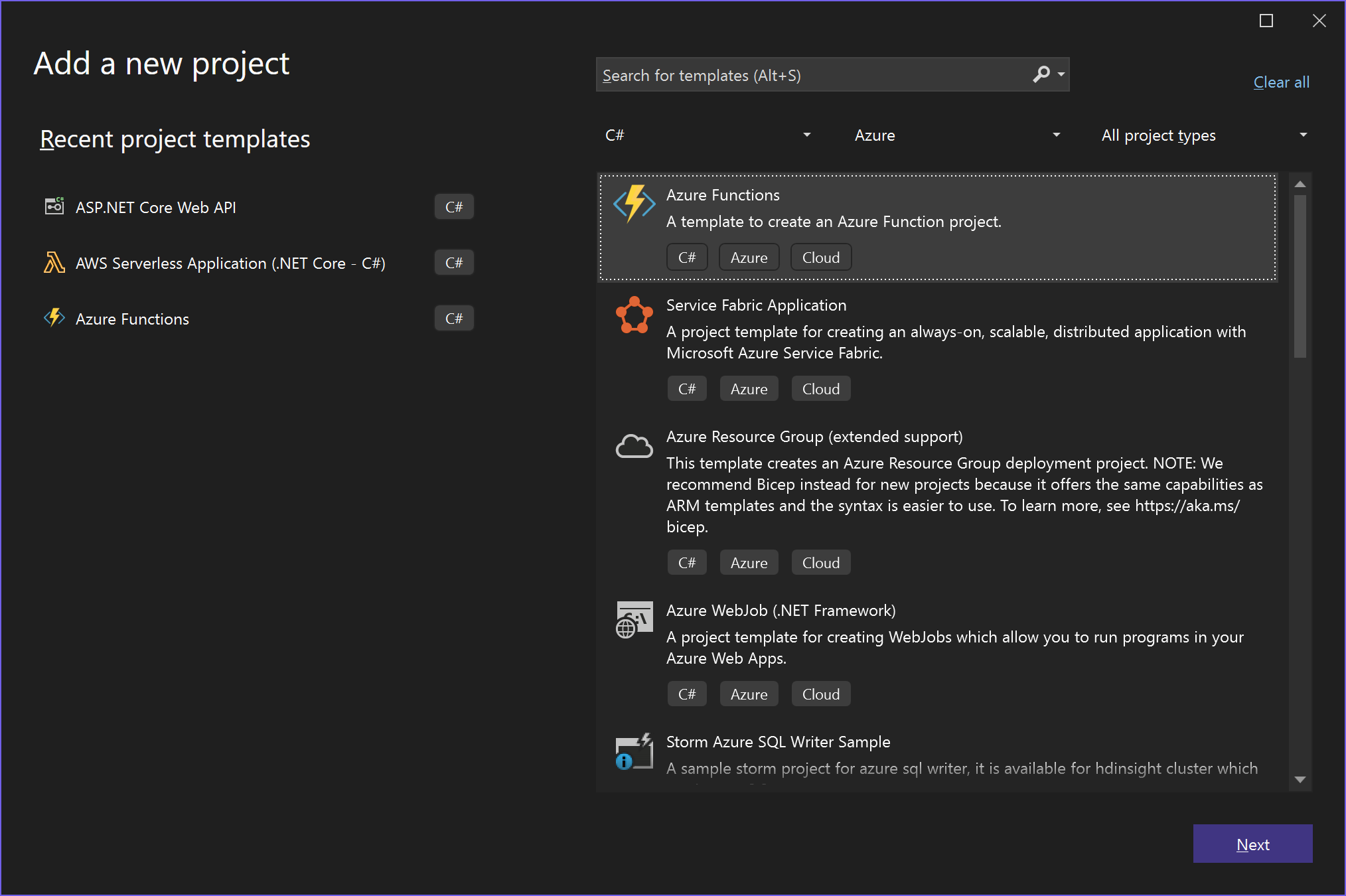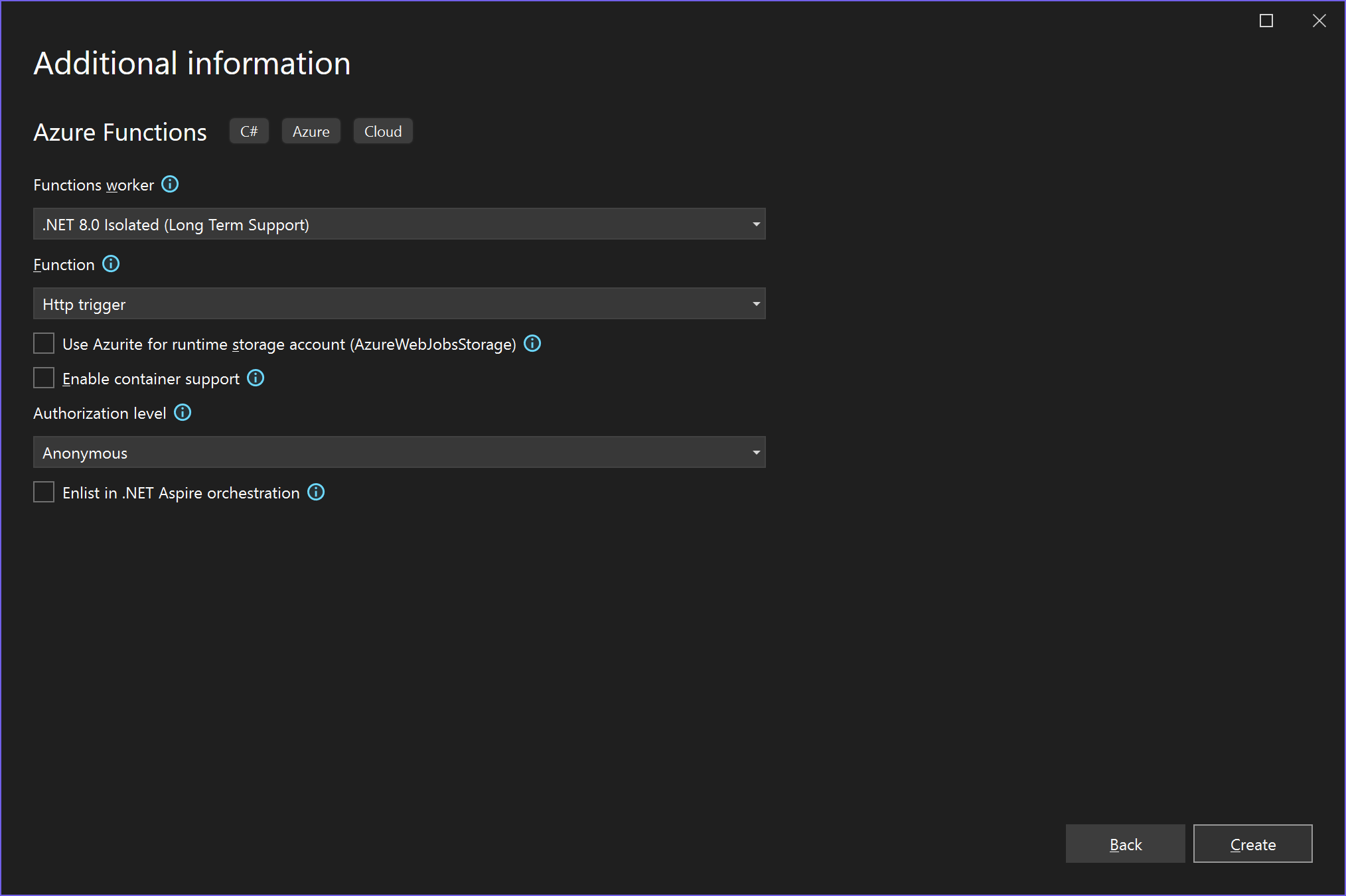CommandQuery.AzureFunctions
4.0.0
dotnet add package CommandQuery.AzureFunctions --version 4.0.0
NuGet\Install-Package CommandQuery.AzureFunctions -Version 4.0.0
<PackageReference Include="CommandQuery.AzureFunctions" Version="4.0.0" />
paket add CommandQuery.AzureFunctions --version 4.0.0
#r "nuget: CommandQuery.AzureFunctions, 4.0.0"
// Install CommandQuery.AzureFunctions as a Cake Addin #addin nuget:?package=CommandQuery.AzureFunctions&version=4.0.0 // Install CommandQuery.AzureFunctions as a Cake Tool #tool nuget:?package=CommandQuery.AzureFunctions&version=4.0.0
CommandQuery.AzureFunctions ⚡
Command Query Separation for Azure Functions
- Provides generic function support for commands and queries with HTTPTriggers
- Enables APIs based on HTTP
POSTandGET
Get Started
- Install Azure development workload in Visual Studio
- Create a new Azure Functions (isolated worker process) project
- Install the
CommandQuery.AzureFunctionspackage from NuGetPM>Install-Package CommandQuery.AzureFunctions
- Create functions
- Preferably named
CommandandQuery
- Preferably named
- Create commands and command handlers
- Implement
ICommandandICommandHandler<in TCommand> - Or
ICommand<TResult>andICommandHandler<in TCommand, TResult>
- Implement
- Create queries and query handlers
- Implement
IQuery<TResult>andIQueryHandler<in TQuery, TResult>
- Implement
- Configure services in
Program.cs


Choose:
- .NET 8.0 Isolated (Long Term Support)
- Http trigger
Commands
using CommandQuery.AzureFunctions;
using Microsoft.AspNetCore.Http;
using Microsoft.AspNetCore.Mvc;
using Microsoft.Azure.Functions.Worker;
namespace CommandQuery.Sample.AzureFunctions
{
public class Command(ICommandFunction commandFunction)
{
[Function(nameof(Command))]
public async Task<IActionResult> Run(
[HttpTrigger(AuthorizationLevel.Anonymous, "post", Route = "command/{commandName}")] HttpRequest req,
FunctionContext context,
string commandName) =>
await commandFunction.HandleAsync(commandName, req, context.CancellationToken);
}
}
- The function is requested via HTTP
POSTwith the Content-Typeapplication/jsonin the header. - The name of the command is the slug of the URL.
- The command itself is provided as JSON in the body.
- If the command succeeds; the response is empty with the HTTP status code
200. - If the command fails; the response is an error message with the HTTP status code
400or500.
Commands with result:
- If the command succeeds; the response is the result as JSON with the HTTP status code
200.
Queries
using CommandQuery.AzureFunctions;
using Microsoft.AspNetCore.Http;
using Microsoft.AspNetCore.Mvc;
using Microsoft.Azure.Functions.Worker;
namespace CommandQuery.Sample.AzureFunctions
{
public class Query(IQueryFunction queryFunction)
{
[Function(nameof(Query))]
public async Task<IActionResult> Run(
[HttpTrigger(AuthorizationLevel.Anonymous, "get", "post", Route = "query/{queryName}")] HttpRequest req,
FunctionContext context,
string queryName) =>
await queryFunction.HandleAsync(queryName, req, context.CancellationToken);
}
}
- The function is requested via:
- HTTP
POSTwith the Content-Typeapplication/jsonin the header and the query itself as JSON in the body - HTTP
GETand the query itself as query string parameters in the URL
- HTTP
- The name of the query is the slug of the URL.
- If the query succeeds; the response is the result as JSON with the HTTP status code
200. - If the query fails; the response is an error message with the HTTP status code
400or500.
Configuration
Configuration in Program.cs:
using CommandQuery;
using CommandQuery.AzureFunctions;
using CommandQuery.Sample.Contracts.Commands;
using CommandQuery.Sample.Contracts.Queries;
using CommandQuery.Sample.Handlers;
using CommandQuery.Sample.Handlers.Commands;
using CommandQuery.Sample.Handlers.Queries;
using Microsoft.Azure.Functions.Worker;
using Microsoft.Extensions.DependencyInjection;
using Microsoft.Extensions.Hosting;
var host = new HostBuilder()
.ConfigureFunctionsWebApplication()
.ConfigureServices(ConfigureServices)
.Build();
// Validation
host.Services.GetService<ICommandProcessor>()!.AssertConfigurationIsValid();
host.Services.GetService<IQueryProcessor>()!.AssertConfigurationIsValid();
host.Run();
public static partial class Program
{
public static void ConfigureServices(IServiceCollection services)
{
services.AddApplicationInsightsTelemetryWorkerService();
services.ConfigureFunctionsApplicationInsights();
services
//.AddSingleton(new JsonSerializerOptions(JsonSerializerDefaults.Web));
// Add commands and queries
.AddCommandFunction(typeof(FooCommandHandler).Assembly, typeof(FooCommand).Assembly)
.AddQueryFunction(typeof(BarQueryHandler).Assembly, typeof(BarQuery).Assembly)
// Add handler dependencies
.AddTransient<IDateTimeProxy, DateTimeProxy>()
.AddTransient<ICultureService, CultureService>();
}
}
The extension methods AddCommandFunction and AddQueryFunction will add functions and all command/query handlers in the given assemblies to the IoC container.
You can pass in a params array of Assembly arguments if your handlers are located in different projects.
If you only have one project you can use typeof(Program).Assembly as a single argument.
Testing
using System.Text;
using System.Text.Json;
using CommandQuery.AzureFunctions;
using CommandQuery.Sample.Contracts.Commands;
using FluentAssertions;
using Microsoft.AspNetCore.Http;
using Microsoft.AspNetCore.Mvc.Infrastructure;
using Microsoft.Azure.Functions.Worker;
using Microsoft.Extensions.DependencyInjection;
using Moq;
using NUnit.Framework;
namespace CommandQuery.Sample.AzureFunctions.Tests
{
public class CommandTests
{
[SetUp]
public void SetUp()
{
var serviceCollection = new ServiceCollection();
Program.ConfigureServices(serviceCollection);
var serviceProvider = serviceCollection.BuildServiceProvider();
Subject = new Command(serviceProvider.GetRequiredService<ICommandFunction>());
var context = new Mock<FunctionContext>();
context.SetupProperty(c => c.InstanceServices, serviceProvider);
Context = context.Object;
}
[Test]
public async Task should_handle_command()
{
var result = await Subject.Run(GetRequest(new FooCommand { Value = "Foo" }), Context, "FooCommand");
result.As<IStatusCodeActionResult>().StatusCode.Should().Be(200);
}
[Test]
public async Task should_handle_errors()
{
var result = await Subject.Run(GetRequest(new FooCommand()), Context, "FooCommand");
result.ShouldBeError("Value cannot be null or empty");
}
HttpRequest GetRequest(object body)
{
var request = new Mock<HttpRequest>();
request.Setup(r => r.Body).Returns(new MemoryStream(Encoding.UTF8.GetBytes(JsonSerializer.Serialize(body))));
return request.Object;
}
Command Subject = null!;
FunctionContext Context = null!;
}
}
Samples
| Product | Versions Compatible and additional computed target framework versions. |
|---|---|
| .NET | net8.0 is compatible. net8.0-android was computed. net8.0-browser was computed. net8.0-ios was computed. net8.0-maccatalyst was computed. net8.0-macos was computed. net8.0-tvos was computed. net8.0-windows was computed. |
-
net8.0
- CommandQuery (>= 4.0.0)
- CommandQuery.SystemTextJson (>= 4.0.0)
- Microsoft.Azure.Functions.Worker (>= 1.22.0)
NuGet packages
This package is not used by any NuGet packages.
GitHub repositories
This package is not used by any popular GitHub repositories.
| Version | Downloads | Last updated |
|---|---|---|
| 4.0.0 | 121 | 7/13/2024 |
| 3.0.0 | 526 | 1/9/2023 |
| 2.0.0 | 607 | 7/29/2021 |
| 1.0.0 | 721 | 2/2/2020 |
| 0.9.0 | 694 | 11/20/2019 |
| 0.8.0 | 849 | 2/16/2019 |
| 0.7.0 | 921 | 9/22/2018 |
| 0.6.0 | 975 | 9/15/2018 |
| 0.5.0 | 1,157 | 7/6/2018 |
| 0.4.0 | 1,134 | 5/16/2018 |
| 0.3.2 | 1,167 | 5/1/2018 |
| 0.3.1 | 1,186 | 1/6/2018 |
| 0.3.0 | 1,158 | 1/3/2018 |
| 0.2.1-beta | 882 | 6/7/2017 |
| 0.2.0 | 1,131 | 4/25/2017 |
- Change TargetFramework to net8.0
- Bump Microsoft.Azure.Functions.Worker to 1.22.0
- Remove ILogger parameter from HandleAsync
- Add support for HttpRequest